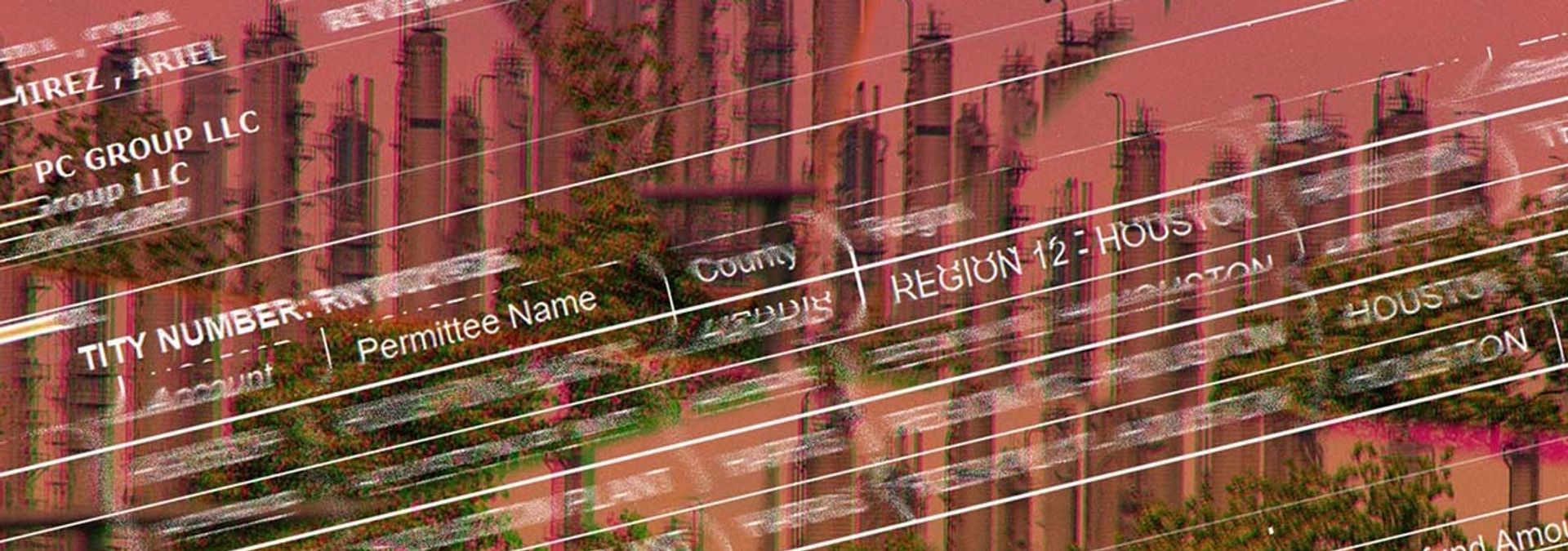
TCEQ listens to corporate polluters, not communities. That has to change.
Public engagement between TCEQ and industry is 'an exercise in futility,' one expert says.
I’ve lived in the East End the last eight years, and I love it, despite the challenges of our proximity to the petrochemical industry. My kids go to great public schools, but the five-minute drive to get them there can turn into a 45-minute labyrinthine quest of maneuvering around idling trains hauling toxic chemicals. Family-owned businesses and tree-lined neighborhoods sit in the shadow of refineries.
Nowhere sums up the hazardous contradictions of the East End more than the TPC Group complex towering over Milby Park near Cesar Chavez High School. Through the sprawl of pipes, smokestacks and bulbous storage containers course cancer-causing chemicals that chronically leak into our air, just across the street from where our children learn and play. All that stands between our families and the threats posed by TPC Group is the Texas Commission on Environmental Quality.
Following Air Alliance Houston’s many campaigns for air quality, I’d learned that TCEQ often serves as little more than a rubber stamp for the state’s worst polluters. They frequently fail to monitor illegal pollution, and when they do find some corporation releasing these harmful chemicals illegally (usually because that company self-reports it), the fines they levy amount to just a fraction of a single day’s profits. The most they can fine a polluter — $25,000 a day, nearly half what the EPA would allow — is less than what a giant like Exxon Mobil makes back in a lunch break.
When I learned that TPC Group had applied for a set of new permits to expand this complex in our community, I was furious, so I signed up to speak at a public hearing. Though I knew enough about TCEQ’s track record to be skeptical, I went in believing that if public sentiment were strong enough, if the evidence against a corporation were damning enough, TCEQ would at least be capable of doing something to protect our air and our health. Maybe they couldn’t shut down a polluter’s operations, but at very least, I expected they could prevent an expansion. I was wrong.
***
TPC Group is a notorious polluter. Most of us first heard about the corporation in 2019, when their plant in Port Neches blew up, forcing a mass evacuation the day before Thanksgiving, filling the air for months with leaks of the cancer-causing chemical, 1,3-butadiene. Some of the ruined equipment was still leaking last summer.
But their Houston plant — the one that they want to expand, near the new Sims Bayou Greenway — illegally released more butadiene that year than the plant that exploded. This pollution joined the other toxics and volatile organic compounds leaking from the dozens of chemical plants on the east side of the city, the harmful emissions from Port Houston’s operations and cargo-handling equipment and the incessant diesel exhaust from third-party companies’ drayage trucks, creating an environment where children living within two miles of the Ship Channel are 56 percent more likely to develop a specific kind of leukemia than children living at least 10 miles away. Cancer rates in Manchester on the other side of Highway 225 are 22 percent higher than the city overall.
These numbers are deeply troubling for me, as I live just a few miles away with my 4-year-old, who has a rare genetic condition called hemihypertrophy, which puts her at a significantly higher risk of developing abdominal cancers. It terrifies me that we live in a neighborhood with an elevated cancer risk, as I and many other concerned residents shared at the August 2021 public hearing about TPC Group’s permit application.
Just being able to attend the voice-only virtual meeting was an unnecessarily convoluted process, involving registering ahead of time, getting a password and downloading an outdated app. The difficulty of simply accessing the meeting, which could have much more easily been hosted with Zoom, seemed purposeful and designed to suppress participation. Still, more than a dozen residents found their way online to testify, and though we could not see each others’ faces, the rage and grief came through.
Some shared personal stories about how the explosion in Port Neches affected them and their families — destroying homes, sickening them with exposures, adding to unknown cancer risks. Others brought up the environmental racism of locating such high concentrations of polluting industry in neighborhoods like Manchester, where 98% of residents are Hispanic or Latino. A teenager who attends Cesar Chavez High School, less than a mile away from TPC Group’s plant, shared how a fire at the plant earlier this year had darkened the skies and poisoned the air over her school. She said the students are terrified that a large explosion, like the one in Port Neches, could kill them in their classrooms.
Not a single commenter in the hours-long meeting thought TPC Group should be allowed to expand. But despite the many heartfelt, angry, tearful pleas not to further poison our air, the TCEQ representative said they had found “no substantial issues” raised against the permit applications. When asked how they will ensure the safety of residents despite their notorious track record, the TPC Group representative simply said they “have no plans” to allow a similar disaster in Houston.
Apparently, that’s good enough for TCEQ.
A track record of illegal pollution releases as one of the Environmental Protection Agency’s “High Priority Violators” is not a substantial issue. An entire high school within a blast zone is not a substantial issue. Our kids risking getting cancer is not a substantial issue.
***
At this point in the meeting, Gabriel Clark-Leach, a lawyer based in Austin with the Environmental Integrity Project, shared that, essentially, the entire public hearing had been an exercise in futility.
As long as a company shows TCEQ — and almost always on their own terms, rarely considering the real risks that people could face — that their permit application is “administratively complete,” the agency tends to defer.
Technically, Texas requires a company to show that all of its facilities in the state are in compliance with the law, but it doesn’t actually matter. It doesn’t matter how many crimes they’ve committed or how many Texans they’ve killed and injured. It doesn’t even matter to TCEQ how much other facilities in the community might already be polluting. TCEQ invariably says, Looks good to us.
I couldn’t believe it. I logged off from the meeting feeling despair and outrage, wondering whether the air is safe to breathe, whether the water that comes through our pipes is making my children sick, and knowing that our health is dependent entirely on the self-regulation of a petrochemical corporation. Because the agency charged with protecting us is designed to be incapable of fulfilling that promise.
***
TCEQ must be fundamentally changed, and there is a rare, upcoming opportunity to make that happen. Every 12 years, state government agencies undergo a “Sunset Review,” determining whether to continue their funding and make changes based on the Sunset Advisory Commission’s recommendations. Yes, it’s another convoluted, bureaucratic process, but Texans have used the sunset review to make meaningful changes before. In 2002, a free online system was created so everyone can see when companies report their permit violations. In 2010, TCEQ increased its maximum daily fine for polluters.
Still a pittance, but progress.
Far more is needed. During the sunset review, Texans must demand that TCEQ be reformed. The night of the TPC hearing, TCEQ couldn’t have acted on the pleas of community members asking them to protect us, even if they had wanted to. That’s a substantial issue, as far as I’m concerned. Texans need an environmental quality agency that exists to protect us from industry, not the other way around.
Kern is a journalist and author who lives along Brays Bayou in Houston. You can find them on Twitter @sim_kern and on the web.
STAY UP TO DATE
The quality of our newsletter is considered satisfactory and poses little or no risk.
SUBSCRIBE

